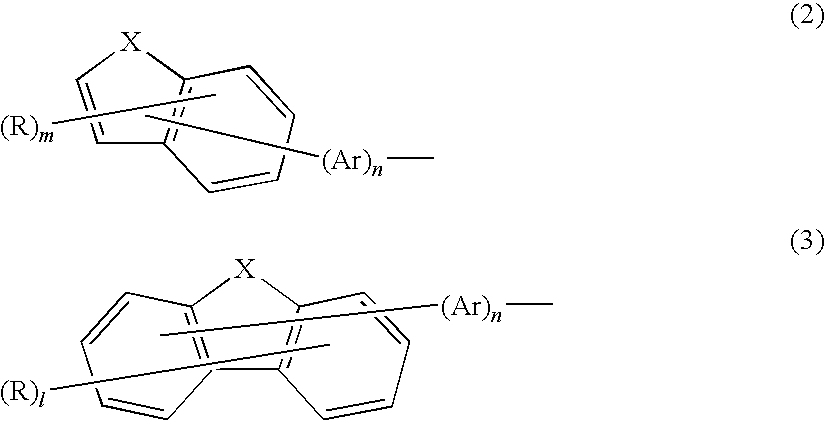Aromatic amine derivative and organic electroluminescent device using the same
- Summary
- Abstract
- Description
- Claims
- Application Information
AI Technical Summary
Benefits of technology
Problems solved by technology
Method used
Image
Examples
synthesis example 1 (
Synthesis of Compound D1)
(1) Synthesis of N-(2-dibenzofuranyl)acetamide
[0131]In a stream of argon, 4.25 g of acetamide, 17.8 g of 2-bromodibenzofuran, 0.7 g of copper iodide, 0.63 g of N,N′-dimethylethylenediamine, 39.7 g of potassium carbonate, and xylene were subjected to a reaction under reflux for 12 hours.
[0132]After having been cooled, the resultant was filtrated, and then clean water and toluene were added to the filtrate so that an organic layer might be separated. The organic layer was washed with clean water three times, and was then concentrated under reduced pressure. As a result, 14.4 g of a yellowish white solid were obtained. The solid was identified as N-(2-dibenzofuranyl)acetamide by field desorption mass spectrometry (FD-MS).
(2) Synthesis of N-(2-dibenzofuranyl)-N-phenylacetamide
[0133]Synthesis was performed in the same manner as in the synthesis of N-(2-dibenzofuranyl)acetamide in the section (1) except that N-(2-dibenzofuranyl)acetamide was used instead of acetam...
synthesis example 2 (
Synthesis of Compound D21)
[0138]Synthesis was performed in the same manner as in the foregoing except that 9,10-dibromoanthracene was used instead of 6,12-dibromochrysene in the section (4) of Synthesis Example 1. The resultant was identified as Compound D21 by FD-MS.
synthesis example 3 (
Synthesis of Compound D57)
(1) Synthesis of N,N-(di-2-dibenzofuranyl)acetamide
[0139]In a stream of argon, 4.25 g of acetamide, 37.0 g of 2-bromodibenzofuran, 0.7 g of copper iodide, 0.63 g of N,N′-dimethylethylenediamine, 39.7 g of potassium carbonate, and xylene were subjected to a reaction under reflux for 12 hours.
[0140]After having been cooled, the resultant was filtrated, and then clean water and toluene were added to the filtrate so that an organic layer might be separated. The organic layer was washed with clean water three times, and was then concentrated under reduced pressure. As a result, 22.5 g of a white solid were obtained. The solid was identified as N,N-(di-2-dibenzofuranyl)acetamide by FD-MS.
(2) Synthesis of N,N-(di-2-dibenzofuranyl)amine
[0141]Synthesis was performed in the same manner as in the section (3) of Synthesis Example 1 except that N,N-(di-2-dibenzofuranyl)acetamide synthesized in the section (1) was used instead of N-(2-dibenzofuranyl)-N-phenylacetamide in...
PUM
 Login to View More
Login to View More Abstract
Description
Claims
Application Information
 Login to View More
Login to View More - R&D
- Intellectual Property
- Life Sciences
- Materials
- Tech Scout
- Unparalleled Data Quality
- Higher Quality Content
- 60% Fewer Hallucinations
Browse by: Latest US Patents, China's latest patents, Technical Efficacy Thesaurus, Application Domain, Technology Topic, Popular Technical Reports.
© 2025 PatSnap. All rights reserved.Legal|Privacy policy|Modern Slavery Act Transparency Statement|Sitemap|About US| Contact US: help@patsnap.com



